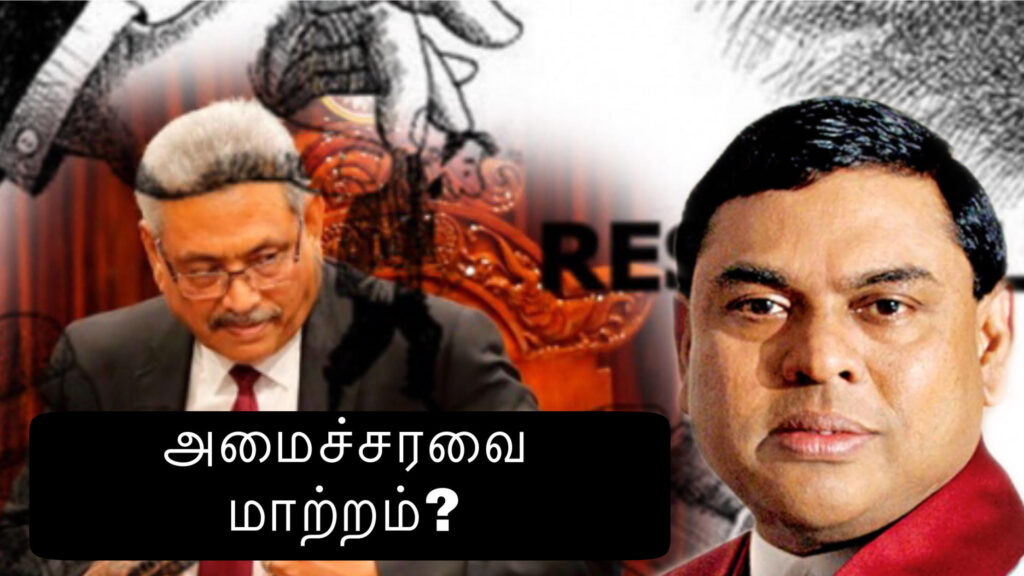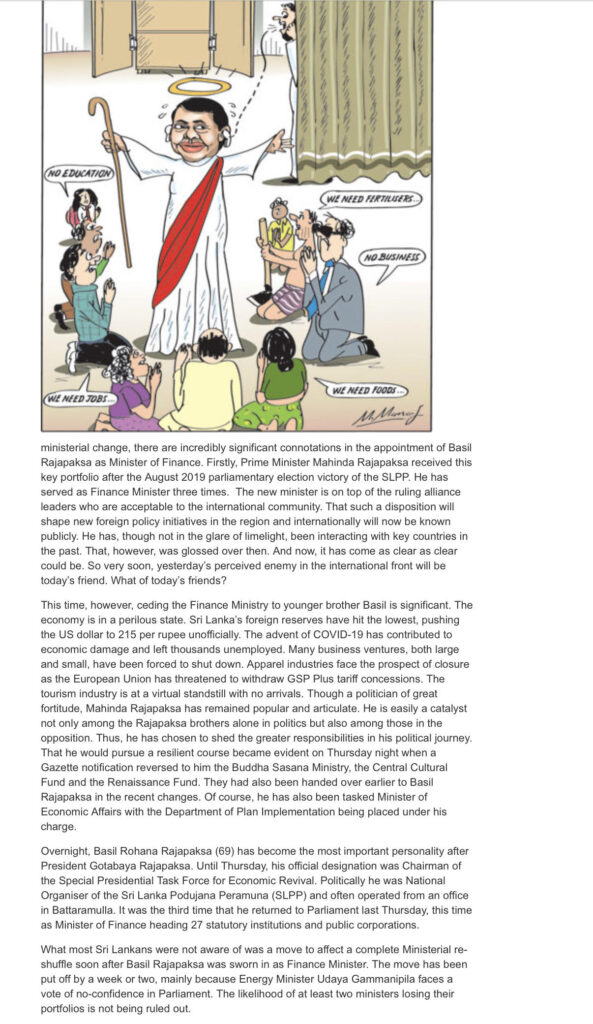 நிதி அமைச்சராக பஸில் ராஜபக்ஸ பதவியேற்ற கையோடு ஜனாதிபதி கோட்டபாய ராஜபக்ஸ முற்றுமுழுதான அமைச்சரவை மாற்றத்தை மேற்கொள்ள உத்தேசித்திருந்த போதிலும் பின்னர் அத்திட்டம் ஓரிரு வாரங்களுக்கு பிற்போடப்பட்டுள்ளதாக தகவல் வெளியாகியுள்ளது.
நிதி அமைச்சராக பஸில் ராஜபக்ஸ பதவியேற்ற கையோடு ஜனாதிபதி கோட்டபாய ராஜபக்ஸ முற்றுமுழுதான அமைச்சரவை மாற்றத்தை மேற்கொள்ள உத்தேசித்திருந்த போதிலும் பின்னர் அத்திட்டம் ஓரிரு வாரங்களுக்கு பிற்போடப்பட்டுள்ளதாக தகவல் வெளியாகியுள்ளது.
எரிசக்தி அமைச்சர் உதய கம்மன்பிலவிற்கு எதிராக கொண்டுவரப்படவுள்ள நம்பிக்கையில்லா பிரேரணையே அமைச்சரவை மாற்றம் பிற்போடப்பட்டமைக்கு காரணம் என இலங்கையின் முன்னணி ஆங்கிலப்பத்திரிகையான சண்டே டைம்ஸ் செய்திவெளியிட்டுள்ளது.
தற்போது அமைச்சரவையிலுள்ள அமைச்சர்களில் இருவர் தமது பதவிகளை இழக்கும் சாத்தியமுள்ளதாகவும் அப்பத்திரிகை சுட்டிக்காட்டியுள்ளது.
எரிபொருள் விலை அதிகரிப்பை அடுத்து அமைச்சர் உதய கம்மன்பிலவிற்கு எதிராக குற்றச்சாட்டுக்களை முன்வைத்த பொதுஜன பெரமுண கட்சியின் செயலாளர் நாயகமும் பாராளுமன்ற உறுப்பினருமான சாகல காரியவசம் பஸில் ராஜபக்ஸவின் நெருங்கிய ஆதரவாளர் எனவும் அவருக்கு ஆளுங்கட்சியின் பிரதி கொரடா பதவி வழங்கப்பட்டுள்ளமை எதிர்காலப்போக்கை கட்டியங்கூறுவதாகவும் அந்தச் செய்தியில் மேலும் தெரிவிக்கப்பட்டுள்ளது.
தற்போது அமைச்சர்களதும் அதிகாரிகளதும் செயற்பாடுகள் தொடர்பாக ஜனாதிபதி செயலகம் மதிப்பாய்வை மேற்கொண்டுள்ளதாகவும் இதில் குறிப்பாக அவர்களது கொள்வனவு நடைமுறைகள் தொடர்பாக கவனம் செலுத்துவதாகவும் கூறப்படுகின்றது.
இதேவேளை பஸில் ராஜபக்ஸவிற்கு முன்னெப்போதுமில்லா வகையில் அதிகாரங்கள் வழங்கப்பட்டுள்ளதாக சுட்டிக்காட்டியிருக்கும் சண்டே டைம்ஸ் இந்த அதிகாரங்கள் மூலமாக ஜனாதிபதி கோட்டாபய ராஜபக்ஸவிற்கு அடுத்து நாட்டில் அதிகாரமிக்கவராக பஸில் ராஜபக்ஸ வலுப்பெற்றுள்ளதாக தெரிவித்துள்ளது.
அண்மையில் வெளியிடப்பட்ட 9 பக்கங்கள் கொண்ட வர்த்தமானியில் பஸில் ராஜபக்ஸவிற்கு வழங்கப்பட்டுள்ள அதிகாரங்கள் குறித்து தெளிவாக குறிப்பிடப்பட்டுள்ளது.
பஸில் ராஜபக்ஸவே இனிமேல் நல்லிணக்க விடயங்களையும் அரசாங்கத்தின் சார்பாக கையாள்வார் எனவும் இதன் காரணமாகவே கூட்டமைப்பின் ஜனாதிபதி கோட்டாபய ராஜபக்ஸவுடனான சந்திப்பும் பிற்போடப்பட்டதாக சுட்டிக்காட்டப்பட்டுள்ளது.
நல்லிணக்கத்தைத் தவிர தேசிய பொருளாதார கொள்கை, வகுப்பு தேசிய கொள்கை வகுப்பு ,சர்வதேச நிதி நிறுவனங்களுடனான ஒருங்கிணைப்பு, அனைத்து அமைச்சுக்களுடனான ஒருங்கிணைப்பு என பல்வேறு பொறுப்புக்களும் பஸில் ராஜபக்ஸவிடம் வழங்கப்பட்டுள்ளமை குறிப்பிடத்தக்கது.

A nine-page Gazette notification issued on Wednesday sets out the subjects and functions of the finance minister. They are:
1. Formulating policies in relation to the subject of economic policies and plan implementation, in conformity with the prescribed Laws, Acts and Ordinances, implementation of projects under the national budget, state Investment and National Development Programme, and formulating, implementing, monitoring and evaluating policies, programmes, and projects, related to subjects and functions under below-mentioned State Corporations and Statutory Institutions for “economic policies & plan implementation” based on the national policies implemented by the government, and in accordance with the policy statement “Vistas of Prosperity and Splendour”.
2. Facilitating of carrying out relevant development activities while coordinating all ministries with the Presidential Task Force for Economic Revival and Poverty Alleviation and the Presidential Task Force to transform Sri Lanka into a Green Socio economy with Sustainable Solutions for Climate Change.
3. Coordinating with the Presidential Task Force for Gama Samaga Pilisandara Rural Development.
4. Monitoring and reviewing the cost of living and the flow of goods and services among the community of consumers, making periodic requests to the Cabinet Committee on Cost of Living to ensure that consumers as well as local producers and suppliers receive goods and services at the reasonable prices.
5. Implementing people-centric development activities by coordinating the development activities of District and Divisional Development Committees and Provincial Councils.
The following have been listed as special priorities for the Finance Minister:
1. Formulation and implementation of national development programmes and projects to achieve the sustainable development goals in accordance with the Policy Statement; “Vistas of Prosperity and Splendour.”
2. Formulation of national policies
3. Co-ordination of State, Private and Co-operative sectors for facilitating the private sector participation in economic development.
4. Implementation of rural and regional economic development policies and strategies.
5. Co-ordination of all Ministries and other relevant institutions for directing the infrastructure development, investment promotion, regulation of organic fertiliser production and other Government flagship development programmes towards the expected goals.
6. Take necessary measures to consolidate International Banks, funds, and local Banks to uplift the rural and regional economy while strengthening grassroots level network of service delivery network.

